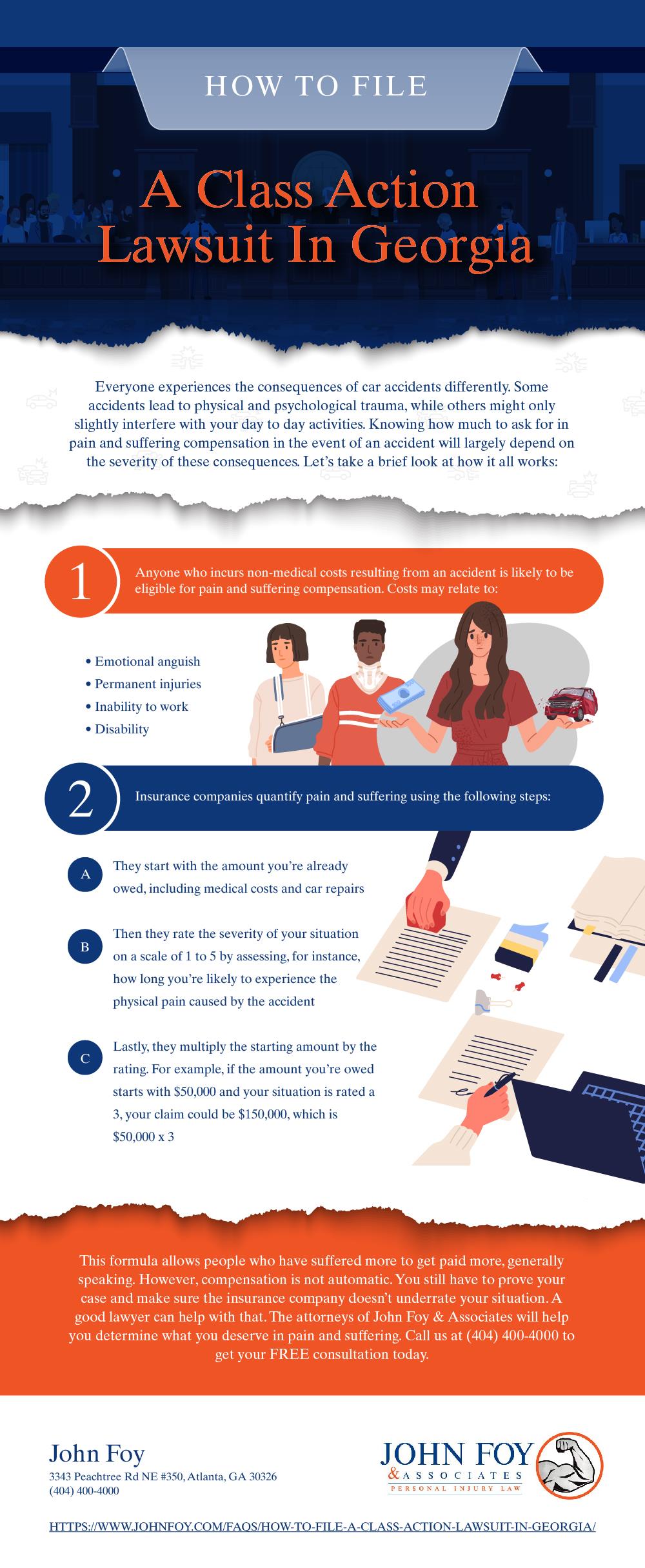
You can file a class-action lawsuit in Georgia by working with an attorney to submit the appropriate paperwork to the court. You may also join a current lawsuit to get the compensation you need.
You can learn more about the detailed steps of this legal process with an Atlanta class action lawsuit lawyer.
How to File a Georgia Class-Action Lawsuit

In Georgia and nationwide, you can start a class-action lawsuit in two ways:
- You can join an existing class-action lawsuit (one that has already been filed, for the same or similar issue as your case)
- You can file a class-action lawsuit (when there is no existing class-action for the issue you’re dealing with)
Most consumers who get money from a class-action lawsuit didn’t file it themselves. Instead, they joined a suit that was already in progress.
For example, let’s say you own a certain model of car, and the transmission dies suddenly, much earlier than it was supposed to. You do some digging and find out that other people with the same model had the same problem or other transmission problems.
If enough consumers were affected, there’s a good chance that someone has already started a lawsuit against the maker of the car.
Get the strong arm
How to File Your Class-Action Lawsuit
You will rarely be the first consumer to come forward and take legal action, but if that’s the case, you’ll need to talk to a lawyer with experience handling class-action cases.
Class-action cases are very different from other types of litigation and require their own skill set. Remember: a class-action lawsuit means going up against a company with deep pockets.
An attorney can help with:
Choosing a Court
Your lawyer will choose a jurisdiction in which to file your lawsuit. This decision will vary depending on where most affected consumers live and the location of the company’s headquarters.
The Initial Hearings
The judge will hold a series of hearings. These are not the trial—they are initial hearings so the court can decide if the case merits a lawsuit. The judge will either “certify” the case and allow it to go forward, or reject it.
If your lawsuit is certified, your lawyer will likely work with various attorneys representing other victims, and the case will go forward. It will most likely end in a negotiated settlement with the company, rather than a full courtroom trial.
If the judge rejects your lawsuit, your lawyer may be able to file it with a different jurisdiction instead. It depends on the specifics of the case and why the judge decided to issue a rejection.
How to Join an Existing Class-Action Lawsuit
Here are the steps to joining a class-action lawsuit:
- Determine if there is already a lawsuit for your issue. A quick online search may provide this information.
- Talk to an attorney about your options. They can help you decide if you’re eligible to join it and whether you’d stand to make more on your own. If the lawsuit is not yet active in Georgia, your attorney can help you expand it to include you.
- Put together documentation. You need to prove that you purchased the product or service in question.
- You do not have to take any action to officially “join” the lawsuit. But you need to keep an eye on the latest developments in the case. Most class-action lawsuits have an email list or website so you can easily get updates.
- If the lawsuit wins money, you can either collect your share of it or choose to opt out (see below).
You can get additional legal advice from an experienced attorney. A lawyer can help you understand the legal procedures required to proceed with your claim.
Why File a Class-Action Lawsuit?
Class-action lawsuits are an excellent tool because they usually require very little time or effort from you, the victim. You may not even need to testify, although if you are one of the initial victims who comes forward, you are more likely to be asked to do so.
Most lawsuits involve a single individual suing another individual or company. Class-action lawsuits are different in that they allow an entire group or “class” of people to bring a single lawsuit against a company that wronged them.
These actions are ideal when a company wrongs a large number of consumers in a similar way, and they are one of the most powerful weapons consumers have.
Will You Get Fair Compensation?
Filing a lawsuit with other injury victims can help you get a financial award to cover all of your losses. The court could award the potential class funds to pay for their:
- Medical expenses
- Lost wages
- Reduced earning potential
- Pain and emotional distress
In some cases, the court may also award punitive damages. Punitive damages serve as a way to punish the at-fault party. You can learn more about all the funds available in your specific situation with a professional legal team.
Don’t Make the Decision to Opt Out of a Lawsuit Lightly
Whether to opt out of a class-action lawsuit or not is an important decision. If you take a share of the settlement, you will give up your right to file an individual lawsuit.
Giving up this right is usually good—you don’t have to take your chances in court, or deal with legal fees, and can just collect your share of the winnings with the entire class. However, there are circumstances where you might come out ahead if you filed your separate lawsuit with help from an Atlanta product liability lawyer.
You should discuss your legal claim with an Atlanta personal injury lawyer before you make a final decision.
Learn More About How to File a Class-Action Lawsuit
So, how do you file a class-action lawsuit in Georgia? You need to work with an attorney who can help you submit the correct paperwork to the court. Your attorney may also help you join an already-active lawsuit.
You can rely on our team at John Foy & Associates to help in this situation. We are a large, highly recognized law firm with the resources to handle litigation and over 20 years of experience.
We’re happy to help you determine if you have a case and what your best next steps are. Call us or fill out the form to your right and get your FREE consultation today.
(404) 400-4000 or complete a Free Case Evaluation form
